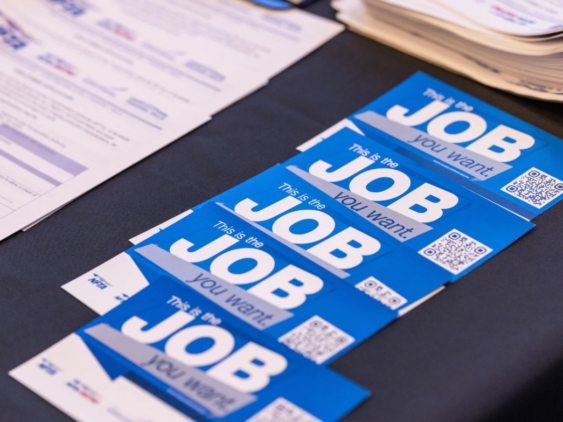AI is changing the way startups hire. Here’s how
October 21, 2025
October 21, 2025

As startups bet on AI tools to rapidly grow, one expert says we should look to entrepreneurs to understand the “economic implications” of the tech for the workforce.
“If innovation comes disproportionately from startups — and it does — then startups are enormously important to economic growth, job creation, [and] opportunity expansion,” said John Dearie, president of the nonprofit Center for American Entrepreneurship, which advocates for founders.
Founders say their AI budgets are still growing. More than 70% indicated that they’re increasing spending on AI and automation in an August study of 1,500 early-stage founders by fintech firm Mercury.
Dearie, who conducts AI roundtables with entrepreneurs across the U.S., talked to Quartz about how founders’ hiring practices are evolving as AI becomes a dominant force in their strategic planning.
Entrepreneurs are using AI to automate and optimize the “energy- and human-intensive aspects” of their businesses, Dearie said.
Carolyn Pitt, founder and CEO of Productions.com who participated in one of Dearie’s roundtables, said that many of the core areas of her company are facilitated by AI tools — including sales, marketing, and operations.
“It enables us to extend our bandwidth as a nimble team,” she added.
Dearie noted that automating these “time intensive” tasks does have negative implications for hiring, however, especially for younger workers.
“Many startups tend to have the need to be capital efficient when it comes down to deciding whether we’re leveraging an entry-level individual or AI — [and] sometimes AI wins,” Pitt said.
Currently, Pitt’s company doesn’t have any interns on staff since, in some cases, AI is “doing the work that some of the interns would do.” Although this isn’t a long-term plan for her company, Pitt said AI can “facilitate many of those roles.”
While workers, researchers, and even Athropic’s CEO have raised concerns over AI replacing entry-level jobs, some are focused on the potential upsides.
“I don’t think this is all bad,” one Reddit user wrote in a thread on AI agents. “It pushes people to think more like entrepreneurs earlier — whether that means starting a small business, freelancing, or stacking skills in ways that give them leverage.”
Dearie added that the tech could also open up new opportunities for freshly graduated workers.
The founders he spoke with told him they view younger workers as “a source of expertise on the latest AI,” as they’re more comfortable “using [AI tools] in their daily life.” He added that these startups are seeking out more workers who use AI “almost as a matter of second nature.”
Although AI is triggering startups to scale back hiring for some roles, Dearie said it’s also letting them identify new customer needs which “has opposite implications for hiring,” because solving these problems “will likely require more people.” And according to Mercury’s survey, startups using AI are actually hiring more than those not using it — almost 70% compared to 13% not using AI.
Even with potentially new opportunities on the horizon for workers, the lingering question remains which skills these new roles will require — and which workers fit the mold.
“[Entrepreneurs] would rather focus on attracting older, more experienced senior-level workers who know and understand AI and know how to manage AI tools to help take [their] business to the next level,” Dearie said when describing some founders’ “ideal” candidates. “And [they’re] willing to pay for it.”
Founders want workers who can still bring that “mature perspective” while also possessing the ability to stay on top of the latest AI tools to help startups figure out their approach to the tech, he said.
What this would look like, Dearie said, is a person at the top who manages less people, but gets “more value out of AI for the business.” At the same time, founders still want workers who are “creative thinkers” and know “how to solve problems.”
“For me, it is finding people that bring that incredible human capacity that are the best in class in their divisions, who also embrace AI and its abilities and its limitations,” Pitt said, however adding that “human capacity, empathy, thought, and creativity can never be completely mimicked by AI.”
AI is a “tool that’s very powerful and consequential, but at the end of the day, businesses still need people who can confront problems and come up with creative ways to solve them,” he said. Pitt believes that AI has “raised the value” of more experienced workers.
Founders told Dearie that since AI is “developing so rapidly,” it makes it “very hard to plan” how they’re going to implement AI into their businesses.
“They specifically told us if we write business plans or we come up with an approach to how we’re going to use AI, it’s going to be different in 18 months,” Dearie said.
Pitt said that while advancements in AI are mostly exciting, as a business owner you “don’t want to get behind the curve.”
The Mercury survey found that startups using AI are more likely to use contractors than ones not using AI. And those who have heavily adopted AI are nearly four times as likely to say they’re “very reliant” on contractors compared to companies not using AI.
As the AI frontier changes “every 18 to 24 months,” Dearie argues that relying on contractors is a way for founders to “hedge the risk” that those workers’ skills will be “obsolete in two years;” Dearie thinks AI is going to be a “further accelerant” to the gig economy.